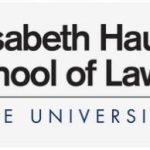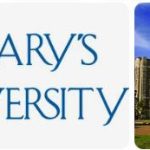The University of Notre Dame Law School was founded in 1869 by a group of lawyers and judges. The school was established with the intention of providing legal education to the people in the Midwest, specifically Indiana. Initially, classes were held in downtown South Bend, but eventually the school moved to its current location on Notre Dame’s campus. Since then, Notre Dame Law School has become one of the top law schools in the nation and has produced many notable alumni who have gone on to become successful attorneys, judges, politicians, and business leaders.
Notre Dame Law School’s mission is to educate students for lives as ethical and responsible lawyers. To this end, it offers an array of courses that cover a wide range of legal topics from civil procedure to constitutional law. It also provides students with ample opportunities for hands-on learning through moot court competitions, externships at local law firms and government offices, and other experiential learning opportunities. In addition to its rigorous academic program, Notre Dame Law School boasts an active student life that includes student organizations ranging from the Public Interest Law Forum to Women’s Legal Forum to Intellectual Property Association. This strong sense of community helps foster a supportive environment where students can grow academically and personally.
University of Notre Dame Law School is located in the state of Indiana. As one of the leading law programs, University of Notre Dame Law School has a high average LSAT score of 163-167 when recruiting new students. As a return, the median starting salary for law graduates reaches $150,000 per year. See the following table for detailed admissions information and career profiles of University of Notre Dame Law School.
Admissions: University of Notre Dame
The University of Notre Dame Law School has an impressive admissions profile with an acceptance rate of 28.5%. The school admits about 230 students each year, making it one of the most selective law schools in the country. The median LSAT score for accepted students is 164, and the median GPA is 3.76. The school also looks for applicants who demonstrate a commitment to service and leadership in their communities. The admissions process at University of Notre Dame Law School is highly competitive, and only the strongest candidates will be offered admission. Students who are accepted into the program can expect a rigorous academic experience that will prepare them for a successful legal career. In addition to its academic offerings, Notre Dame Law School also provides extracurricular activities that allow students to gain practical experience as well as network with professionals in the legal field. These activities include moot court competitions, student-run publications, clinics, and externships.
| Fall 2019 Admissions and Enrollment Statistics | |
|---|---|
| Total number of full- and part-time applicants | 3,178 |
| Total number of full- and part-time acceptances | 810 |
| Overall acceptance rate | 25.5% |
| Total number of full- and part-time first-year students enrolled | 186 |
| Number of full-time program applicants | 3,178 |
| Number of full-time program acceptances | 810 |
| Full-time acceptance rate | 25.5% |
| Number of first-year full-time students enrolled | 186 |
| Number of part-time program applicants | 0 |
| Number of part-time program acceptances | 0 |
| Part-time acceptance rate | N/A |
| Number of first-year part-time students enrolled | 0 |
| Fall 2019 GPA and LSAT Scores | |
| 25th-75th percentile GPA scores for all students | 3.36-3.74 |
| 25th-75th percentile LSAT scores for all students | 163-167 |
| 25th-75th percentile undergraduate GPA for full-time students | 3.36-3.74 |
| 25th-75th percentile LSAT scores for full-time students | 163-167 |
| 25th-75th percentile undergraduate GPA for part-time students | N/A |
| 25th-75th percentile LSAT scores for part-time students | N/A |
Careers: University of Notre Dame
| Bar Statistics (Winter and Summer 2018 administrations) | |
|---|---|
| State where the greatest number of first-time test takers took the bar | IL |
| School’s bar passage rate for first-time test takers | 100.0% |
| Statewide bar passage rate for first-time test takers | 90.8% |
| Class of 2018 Graduates | |
| Total graduates | 186 |
| Graduates employed at graduation | 89.8% |
| Graduates known to be employed nine months after graduation | 98.7% |
| Starting Salaries of 2018 Graduates Employed Full-time | |
| 25th percentile private sector starting salary | $120,000 |
| Median private sector starting salary | $150,000 |
| 75th percentile private sector starting salary | $160,000 |
| Percent in the private sector who reported salary information | 68% |
| Median public service starting salary | $52,500 |
| Areas of Legal Practice (Class of 2018) | |
| Percent employed in academia | 1.1% |
| Percent employed in business and industry | 5.5% |
| Percent employed in government | 11.7% |
| Percent employed in all judicial clerkships | 14.4% |
| Percent employed in law firms | 60.6% |
| Percent employed in public interest | 6.7% |
| Percent employed in an unknown field | 0.0% |
| Percent employed in a judicial clerkship by an Article III federal judge | 7.8% |
| 2018 Graduates Employment Location | |
| Graduates employed in-state | 7% |
| Graduates employed in foreign countries | 0% |
| Number of states where graduates are employed | 34 |
| New England (CT, ME, MA, NH, RI, VT) | 3.3% |
| Middle Atlantic (NY, NJ, PA) | 12.8% |
| East North Central (IL, IN, MI, OH, WI) | 35.5% |
| West North Central (IA, KS, MN, MO, NE, ND, SD) | 2.8% |
| South Atlantic (DE, DC, FL, GA, MD, NC, SC, VA, WV) | 17.8% |
| East South Central (AL, KY, MS, TN) | 1.1% |
| West South Central (AR, LA, OK, TX) | 6.1% |
| Pacific (AK, CA, HI, OR, WA) | 15.0% |
| Mountain (AZ, CO, ID, MT, NV, NM, UT, WY) | 5.6% |
| Employment location unknown | 0.0% |
| Career Services | |
| (Data appear as originally submitted by this school) | |
| Career services operations | The Career Services Office is dedicated to encouraging a wide range of opportunities for students, including on campus interviews, diverse employers who cannot interview on campus, off-site interviews and career fairs. The office sponsors a variety of programs and participates in multiple programs off-campus, with special emphasis on public service. |
| Job Type | |
| Bar admission required or anticipated (e.g., attorney and corporate counsel positions, law clerks, judicial clerks) | 96.7% |
| J.D. preferred, law degree enhances position (e.g., corporate contracts administrator, alternative dispute resolution specialist, government regulatory analyst, FBI special agent) | 1.1% |
| Professional/other (jobs that require professional skills or training but for which a J.D. is neither preferred nor particularly applicable; e.g., accountant, teacher, business manager, nurse) | 1.1% |
| Nonprofessional/other (job that does not require any professional skills or training or is taken on a temporary basis and not viewed as part of a career path) | 1.1% |









